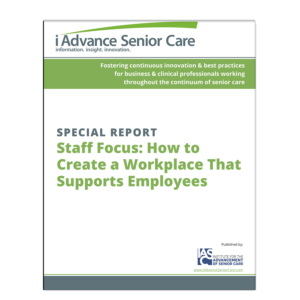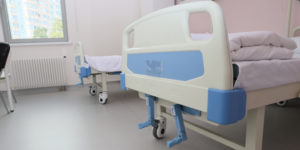Appreciating your ‘invisible’ staff
Largely missing from the array of “employee appreciation” articles we usually see are two groups of nursing facility staff who rarely receive the attention they deserve: housekeeping/laundry/dietary workers and medical directors. People working in the kitchen, laundry, and housekeeping departments are like the stagehands at a play: They are practically invisible and almost faceless, but without their hard work, faithfully and consistently performed, the show would not go on. Because they function “behind the scenes,” they aren’t as visible as nursing staff, but these good people aren’t any less important.
Behind-the-Scenes Staff
A wise administrator makes it a point to know her support staff by name, visits behind-the-scenes areas, talks to her workers, and acknowledges their contributions. Expand the caring heart you have for your residents and frontline staff to include those who are not directly involved in resident care. Furthermore, recognize that these often-ignored people are worthy of some training beyond their work duties. For example, many housekeepers perform their jobs quickly and quietly, trying to be unobtrusive. What they don’t realize, however, is that residents may interpret such behavior as a desire on the housekeepers’ part to ignore them. This can make residents feel insignificant and like they are not worth interaction. Some additional in-service training would give housekeepers guidance on how to talk with residents and, when appropriate, even help in small ways; by doing so, they can be a source of serendipitous assistance to chronically overworked CNAs.
All housekeepers should be trained in basic resident relations, which would include an awareness of the physical and mental changes inherent in aging, as well as the emotional impact of disability and dependency. After providing this basic instruction, ask housekeepers what additional training might be helpful (keeping in mind that they’re not substitute CNAs). At a minimum, housekeepers should be encouraged to approach residents with an attitude of easygoing friendliness. Allay any reservations they might have about “bothering” residents. This reassurance will pay dividends in both resident and housekeeper satisfaction. As hard as it is to find good employees, particularly among support staff, it is eminently worthwhile to invest in helping them enjoy being at work.
The housekeeping supervisor (as well as the administrator and DON) should watch for housekeepers interacting positively with residents. Recognize these individuals with immediate feedback, perhaps an award, and certainly acknowledge their contributions during performance reviews.
An informal survey I conducted revealed the unanimous sentiment among housekeeping, laundry, and dietary staff that they perceive themselves as unimportant, insignificant, and completely fungible. Everyone wants to feel that their work is appreciated and meaningful, and that they are making a valuable contribution to the organization’s goals. Showing appreciation and gratitude will help improve their commitment to their jobs and the workplace. Lately, there has been much emphasis on the high cost of turnover. What better way to avoid this unnecessary cost than by investing some time and consideration in acknowledging the worth of your support staff? By interacting with them as individuals and by demonstrating that they are worth the investment of company resources, you reinforce their value to the organization.
I have seen both residents and housekeepers positively affected by the simple act of sharing a few pleasantries. A housekeeper who, for instance, performs simple acts for a resident, such as opening or closing the curtains, fetching an object, or obtaining the assistance of a CNA or nurse establishes a bond between herself and the resident. Housekeepers must remember that the rooms they clean contain real human beings who, like them, enjoy casual, person-to-person interaction and dislike being ignored.
By the nature of their jobs, laundry and kitchen staff have very little opportunity to interact with residents—or with practically anybody else. Such a situation leads easily to feelings of isolation and insignificance. The administrator should make time to visit these people—not as an investigator checking on their job performance, but simply as a fellow team member. Not only will staff relations improve, but the valuable insights gained can be used to provide better service to residents. Numerous studies have demonstrated that an administrator who is involved with her entire staff reaps multiple rewards: happier employees (which leads to reduced turnover and improved job performance) and better-cared-for, more satisfied residents.
This, also, is a fruitful area in which to involve the activities director. Some facilities have organized transdepartmental contests that blend people from various departments into eclectic teams for a fun, facility-wide activity. Such activities boost morale and job satisfaction, as well as getting the behind-the-scenes staff “onstage” to interact with residents and other staff (see “Adding More to the Staffing Equation,” by Valdeko I. Kreil, NHA, Nursing Homes/Long Term Care Management, February 2006, p. 8).
And another tip: If you should find yourself with some spare time (even if you have to manufacture it), offer to help. I was never more appreciated than those times I showed up at the (chronically understaffed) kitchen, willing to help wherever I was needed.
The Medical Director
A truly good medical director is a precious asset. A little “special treatment” will go a long way toward keeping him. One of the greatest blessings to a medical director is a good, competent charge nurse who can “run interference” for the doctor, saving him a lot of time. Such a nurse will have a written schedule of all the patients the doctor needs to see, along with the appropriate charts ready on a wheeled cart. Along with the schedule, your medical director will appreciate a listing of vitals for the patients he is to see. The more useful, condensed information your charge nurse can have ready for the doctor, the more efficient he will be able to be. Many nursing home medical directors also have private practices and, for them, time truly is money. Help your medical director make a profit, and you’ll earn his gratitude as well as his loyalty.
Everyone likes to feel valued. Making a little extra effort on behalf of your behind-the-scenes staff and medical director won’t cost you a cent, but it will tell them loud and clear that you appreciate them and their hard work.
For more information, phone (865) 925-1290. To send your comments to the author and editors, e-mail duncan0507@nursinghomesmagazine.com.
Related Articles
Topics: Articles , Staffing











